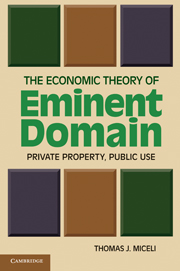Two faculty in the department of economics, Kenneth Couch and Stephen Ross, serve as Associate Editors of journals ranked in the top 30 among the combined pool of economics, public policy and finance outlets according to rankings based on this past year’s Social Science Citation Index. Professor Couch is an Associate Editor of the Journal of Policy Analysis and Management (JPAM) which is the association journal for the Association for Public Policy Analysis and Management (APPAM). JPAM is considered the top journal in the field of public policy and was ranked 29th this past year. Stephen Ross is Associate Editor of the Journal of Urban Economics. The Journal of Urban Economics is the top journal for its topical area and was ranked 18th this past year among the combined group of journals.
Author: kak11010
Thomas Miceli publishes “The Economic Theory of Eminent Domain: Private Property, Public Use”
 Professor Thomas Miceli’s latest book, “The Economic Theory of Eminent Domain: Private Property, Public Use”, has just been published by Cambridge University Press. A brief description of the contents of the book is as follows:
Professor Thomas Miceli’s latest book, “The Economic Theory of Eminent Domain: Private Property, Public Use”, has just been published by Cambridge University Press. A brief description of the contents of the book is as follows:
This book surveys the contributions that economic theory has made to the often contentious debate over the government’s use of its power of eminent domain, as prescribed by the Fifth Amendment. It addresses such questions as: When should the government be allowed to take private property without the owner’s consent? Does it depend on how the land will be used? And what amount of compensation is the landowner entitled to receive (if any)? The recent case of Kelo v. New London (2005) revitalized the debate, but it was only the latest skirmish in the ongoing struggle between advocates of strong governmental powers to acquire private property in the public interest and private property rights advocates. Written for a general audience, the book advances a coherent theory that views eminent domain within the context of the government’s proper role in an economic system whose primary objective is to achieve efficient land use.
Lei Chen in Hartford Courant
PhD graduate Lei Chen published an article in the Hartford Courant outlining Connecticut’s benefits to the manufacturing industry.
Professor Randolph featured on UConn Today
Professor Randolph is featured in an article on the homepage of UConn Today. You can read more about her work evaluating economic and human rights here.
Paramita Dhar defends, heads to CCSU
 On 17th June, 2011, Paramita Dhar defended her dissertation entitled “Essays on the Economics of Housing” under the supervision of Prof. Stephen L. Ross. Paramita’s dissertation examined two different questions about housing and location choice. In her first essay, she analyzed the impact of school quality on property values using a differences-in-differences strategy. In the other two essays of her dissertation, she focused on the issue of discrimination against minority homebuyers that might lead to the segregation of neighborhoods. In both of these essays she used fair housing audit data from the 2000 Housing Discrimination Study on three large minority groups in Los Angeles to examine the causes of spatial variation of the nature of discrimination.
On 17th June, 2011, Paramita Dhar defended her dissertation entitled “Essays on the Economics of Housing” under the supervision of Prof. Stephen L. Ross. Paramita’s dissertation examined two different questions about housing and location choice. In her first essay, she analyzed the impact of school quality on property values using a differences-in-differences strategy. In the other two essays of her dissertation, she focused on the issue of discrimination against minority homebuyers that might lead to the segregation of neighborhoods. In both of these essays she used fair housing audit data from the 2000 Housing Discrimination Study on three large minority groups in Los Angeles to examine the causes of spatial variation of the nature of discrimination.
This fall, Paramita will be heading to Central Connecticut State University as a tenure-track Assistant Professor of Economics.
Catalina Granda-Carvajal defends, heads to Universidad de Antioquia
On June 21, 2011, Catalina Granda-Carvajal defended her dissertation, “Essays on the Macroeconomic Effects of the Unofficial Sector.” Under the valuable supervision and support of her advisor, Prof. Christian Zimmermann, Catalina’s thesis focuses on how the unofficial sector and its intrinsic characteristics are related to aggregate fluctuations. At an empirical level, she determines how business cycle stylized facts vary across countries with the extent of the shadow economy and compares the resulting patterns with predictions from existing models featuring underground activities. Also, she incorporates an irregular sector into a real business cycle model to challenge the notion that fluctuations in the official and unofficial sectors are negatively correlated. Using a similar theoretical framework, she finally addresses how informal firms’ limited access to credit affects macroeconomic and firm volatility.
Pieces of Catalina’s dissertation have been presented in a couple of international conferences and a section was selected for publication at the International Economic Journal last December. In addition to her thesis, she has taken part in an interdisciplinary project on options for brownfields revitalization in Connecticut under the supervision of Prof. Kathleen Segerson. She currently holds a tenure-track position at Universidad de Antioquia in Medellín (Colombia).
Ken Couch gives talks at NSF, Econometric Society, and Fed Conferences
Ken Couch, an Associate Professor in the Department of Economics has been busy this summer with research presentations. During May, he presented a paper at the Federal Reserve Bank of San Francisco regarding economic outcomes of divorce. In June, Ken made a presentation at the Econometric Society Summer Meetings in St. Louis, MO of a paper co-authored with a recent UConn Ph.D., Tao Chen. That paper examines the ability of econometricians to recover the results of a social experiment when random data are not available. In June, Ken also made a presentation at a National Science Foundation conference in Fairfax Virginia on the use of interoperable administrative data for administrative and research purposes.
Professor Randolph on SERF index committee
Professor Susan Randolph and a small group of scholars worked together to create a new SERF index to measure human rights, which has recently generated media coverage. For more information, please see: http://www.csmonitor.com/World/Making-a-difference/Change-Agent/2011/0606/A-new-way-to-measure-human-rights-may-revolutionize-global-advocacy . The new index is expected to be used internationally as a barometer for measuring social and economic rights within a country.
Professor Ross contributes to JPAM Point/Counterpoint on the Foreclosure Crisis
In the spring issue of the Journal of Policy Analysis and Management, Professor Ross takes issue with the conventional wisdom that the foreclosure crisis has been driven by weak underwriting standards and risky mortgage products in the subprime market. Professor Ross argues that the primary cause of the foreclosure crisis was the significant erosion of housing equity among U.S. homeowners in the period leading up to the crisis, which exposed large numbers of homeowners to significant risk of negative equity from even small to moderate declines in housing prices. For example, he notes that in early 2007 well before the financial crisis stuck foreclosure began to rise in all segments of the mortgage market, not just in the subprime sector. The timing of this increase immediately follows declines in housing prices that began in the fourth quarter of 2006 and those foreclosures were overwhelming among households that had little equity in the home prior to those declines, regardless of their particular lender or mortgage product. In light of this evidence, Professor Ross and his coauthors argue the most important policy response for preventing a future foreclosure crisis is to monitor and develop tools for managing aggregate homeowner leverage in the U.S. housing market. This issue has been notably absent from the debate during and following the passage of the recent financial regulatory reform law. Professor Couch edits the Point/Counterpoint series.
For more information, please see the following website: http://onlinelibrary.wiley.com/doi/10.1002/pam.v30.2/issuetoc
Professor Couch Renews Research Contract with Social Security Administration
Prof. Kenneth Couch has renewed his annual research contract with the Social Security Administration to conduct joint studies on Unexpected Lifecycle Events. This work focuses on a variety of unexpected lifecycle events on short and long-term economic well being. One line of research considers the impact of recessions on short and long-term economic well being along with preparedness for retirement. Other topics, such as the impact of changes in family structure on economic well-being and preparedness for retirement, are also being examined as part of the research. The contract allows Professor Couch to travel to Washington, DC regularly to work with researchers within the Social Security Administration on these projects.